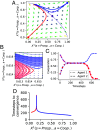Collective cooperative intelligence
- PMID: 40523168
- PMCID: PMC12207418
- DOI: 10.1073/pnas.2319948121
Collective cooperative intelligence
Abstract
Cooperation at scale is critical for achieving a sustainable future for humanity. However, achieving collective, cooperative behavior-in which intelligent actors in complex environments jointly improve their well-being-remains poorly understood. Complex systems science (CSS) provides a rich understanding of collective phenomena, the evolution of cooperation, and the institutions that can sustain both. Yet, much of the theory in this area fails to fully consider individual-level complexity and environmental context-largely for the sake of tractability and because it has not been clear how to do so rigorously. These elements are well captured in multiagent reinforcement learning (MARL), which has recently put focus on cooperative (artificial) intelligence. However, typical MARL simulations can be computationally expensive and challenging to interpret. In this perspective, we propose that bridging CSS and MARL affords new directions forward. Both fields can complement each other in their goals, methods, and scope. MARL offers CSS concrete ways to formalize cognitive processes in dynamic environments. CSS offers MARL improved qualitative insight into emergent collective phenomena. We see this approach as providing the necessary foundations for a proper science of collective, cooperative intelligence. We highlight work that is already heading in this direction and discuss concrete steps for future research.
Keywords: collective action; complex systems science; cooperation; multiagent reinforcement learning.
Conflict of interest statement
Competing interests statement:The authors declare no competing interest.
Figures



References
-
- S. A. Levin, “Collective cooperation: From ecological communities to global governance and back” in Unsolved Problems in Ecology, A. Dobson, D. Tilman, R. D. Holt, Eds. (Princeton University Press, 2020), pp. 311–317.
-
- Hardin G., The Tragedy of the Commons: The population problem has no technical solution; it requires a fundamental extension in morality. Science 162, 1243–1248 (1968). - PubMed
-
- Ostrom E., Governing the Commons: The Evolution of Institutions for Collective Action (Cambridge University Press, 1990).
-
- Rockenbach B., Milinski M., The efficient interaction of indirect reciprocity and costly punishment. Nature 444, 718–723 (2006). - PubMed
-
- Boyd R., Richerson P. J., The evolution of reciprocity in sizeable groups. J. Theor. Biol. 132, 337–356 (1988). - PubMed
LinkOut - more resources
Full Text Sources

